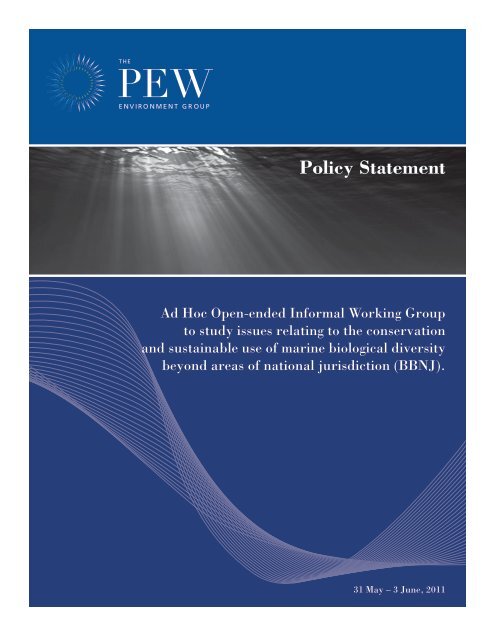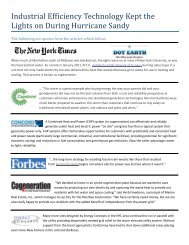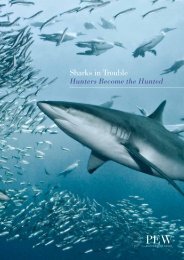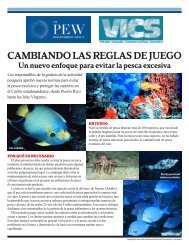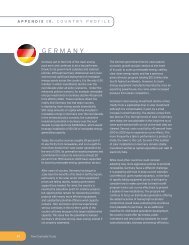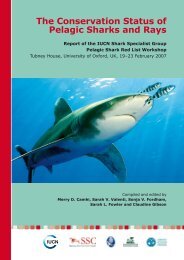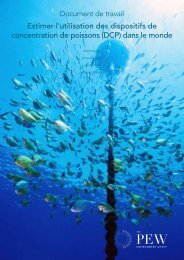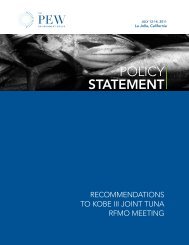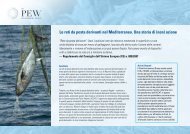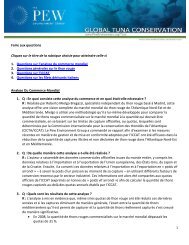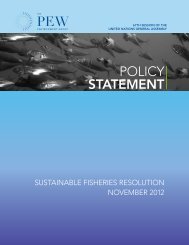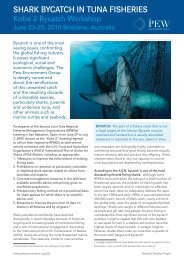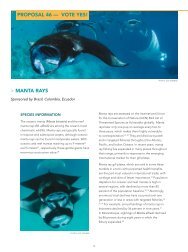Policy Statement: BBNJ (PDF) - Pew Environment Group
Policy Statement: BBNJ (PDF) - Pew Environment Group
Policy Statement: BBNJ (PDF) - Pew Environment Group
Create successful ePaper yourself
Turn your PDF publications into a flip-book with our unique Google optimized e-Paper software.
<strong>Policy</strong> <strong>Statement</strong><br />
Ad Hoc Open-ended Informal Working <strong>Group</strong><br />
to study issues relating to the conservation<br />
and sustainable use of marine biological diversity<br />
beyond areas of national jurisdiction (<strong>BBNJ</strong>).<br />
31 May – 3 June, 2011
The <strong>Pew</strong> <strong>Environment</strong> <strong>Group</strong> urges the international community to take decisive action at the 2011 <strong>BBNJ</strong> meeting<br />
by making strong and concrete recommendations to the United Nations General Assembly (UNGA) for action on<br />
high seas ocean governance for the conservation and sustainable use of marine biological diversity in areas beyond<br />
national jurisdiction.<br />
<strong>BBNJ</strong> can also help ensure progress towards the development of new governance measures for the conservation of<br />
marine biodiversity in areas beyond national jurisdiction at the upcoming United Nations Informal Consultative<br />
Process on Oceans and the Law of the Sea (ICP) and ongoing consultations in the lead up to UNCSD 2012 (Rio+20).<br />
Key challenges in the governance of marine<br />
biodiversity in areas beyond national jurisdiction<br />
include:<br />
Conservation: The status of marine ecosystems<br />
and associated resources continues to deteriorate;<br />
around 1% of the ocean is currently fully protected<br />
Sustainable management: Unsustainable and<br />
destructive fishing practices, illegal, unregulated,<br />
and unreported (IUU) fishing, and overfishing<br />
continue to negatively impact marine living<br />
resources<br />
Integration: Sustainability requirements are not<br />
successfully integrated in other policy areas, such<br />
as fisheries, trade and development<br />
Financing: Resources for enhancing sustainable<br />
management and associated capacity building<br />
remain insufficient, while existing financial flows<br />
and harmful subsidies continue to contribute to<br />
unsustainable activity<br />
Institutional reform: Institutional mechanisms for<br />
sustainable marine governance are absent or in<br />
urgent need of reform<br />
The <strong>BBNJ</strong> must work to address these challenges over<br />
the course of its meeting so as to meet its mandate<br />
(agreed under UNGA resolution 65/73) to address:<br />
a. Past and present activities of the UN and other<br />
relevant international organizations<br />
b. Scientific, technical, economic, legal, environmental,<br />
socio-economic and other aspects<br />
c. Key issues where more detailed background<br />
studies are needed<br />
d. Options to promote international cooperation and<br />
coordination<br />
2<br />
e. Marine genetic resources in areas beyond national<br />
jurisdiction<br />
As such, in line with the broad subject matter of the<br />
<strong>BBNJ</strong> and the agenda for this meeting, the <strong>Pew</strong><br />
<strong>Environment</strong> <strong>Group</strong> urges States at the <strong>BBNJ</strong> meeting<br />
to adopt the following recommendations which call on<br />
States to:<br />
1. Highlight the importance of biodiversity in areas<br />
beyond national jurisdiction in relation to sustainable<br />
development and the further establishment of a<br />
Green Economy.<br />
Ecosystem services provided by the marine<br />
environment are of crucial importance for food<br />
security and poverty eradication. Without healthy<br />
oceans there can be no “Green Economy”.<br />
Restoring the health and economic viability of<br />
ocean systems should be recognized as a critical<br />
priority for sustainable development.<br />
2. Initiate a process towards a new implementing<br />
agreement under the United Nations Convention<br />
on the Law of the Sea (UNCLOS) addressing<br />
governance gaps in areas beyond national<br />
jurisdiction.<br />
This could be accomplished by recommending<br />
that the UNGA initiates a negotiating conference<br />
for a new implementing agreement under<br />
UNCLOS for the protection and conservation of<br />
the marine environment in areas beyond national<br />
jurisdiction based on the precautionary principle<br />
and ecosystem approach that ensures the long<br />
term conservation and sustainable management of<br />
marine biological diversity and marine ecosystems.<br />
Such an outcome could provide crucial momentum<br />
towards more complete implementation of the<br />
Convention and stimulate cooperation between<br />
existing international institutions that manage the
marine environment.<br />
Current gaps which could be specifically addressed<br />
include:<br />
• Comprehensive prior environmental assessments<br />
and strategic environmental assessments, together<br />
with ongoing monitoring of the marine environment;<br />
• Identification, designation and management of a<br />
global representative network of high seas marine<br />
reserves;<br />
• The establishment of a regime for access to, and<br />
sharing of benefits derived from, marine genetic<br />
resources in areas beyond national jurisdiction;<br />
• The provision of access to and dissemination of<br />
information, and transparency in decision-making<br />
processes;<br />
• The establishment of an effective centralized<br />
monitoring, control, surveillance, compliance and<br />
enforcement mechanism for human activities in<br />
areas beyond national jurisdiction;<br />
• New targets and financing mechanisms; and<br />
• Institutional reform including of regional fisheries<br />
management organizations and agreements (RFMO/<br />
As) including international oversight and mechanisms<br />
for agreement and effective implementation of<br />
conservation and management measures at the<br />
national and regional levels.<br />
3. Identify and establish marine protected<br />
areas (MPAs) in international waters, including<br />
representative networks by 2012.<br />
Marine protected areas and no-take marine<br />
reserves are an important tool for ensuring<br />
continued marine biodiversity, and it is vital that<br />
they be established on the high seas as well as<br />
within national jurisdictions. MPAs, including<br />
marine reserves, help build marine ecosystem<br />
resilience and flexibility in the face of existing and<br />
emerging threats. Unfortunately, only around 1%<br />
of the world’s ocean is currently under any kind of<br />
protection.<br />
<strong>BBNJ</strong> should recommend that the UNGA call upon<br />
appropriate international organizations, including<br />
Regional Fisheries Management Organizations<br />
and Arrangements (RFMO/As) and regional seas<br />
organizations where they exist, to identify and<br />
protect areas of importance for the conservation of<br />
biodiversity in areas beyond national jurisdiction.<br />
The decision of the tenth meeting of the<br />
Conference of the Parties to the Convention on<br />
Biological Diversity (CBD) (COP10) to establish a<br />
repository of ecologically or biologically significant<br />
areas (EBSAs) provides a first important step<br />
towards developing representative networks of<br />
MPAs. Target 11 of the CBD Strategic Plan agreed at<br />
COP 10 calls for at least 10% of coastal and marine<br />
areas to be conserved through effectively and<br />
equitably managed, ecologically representative<br />
and well connected systems of MPAs and other<br />
effective area-based conservation measures by<br />
2020. In the meantime, the JPOI called for the<br />
establishment of MPAs by 2012, as well as time/<br />
area closures for the protection of nursery grounds<br />
and periods. While 10% was the goal agreed at<br />
COP-10, scientists advise that 10% is not nearly<br />
enough to achieve necessary management of the<br />
oceans.<br />
4. Require prior environmental impact assessments<br />
and strategic environmental assessments to prevent<br />
or minimize anthropogenic impacts on the ocean for<br />
new and emerging activities in ABNJ.<br />
<strong>BBNJ</strong> should recommend that standards be<br />
adopted requiring States and relevant organizations<br />
to assess whether individual activities would have<br />
adverse impacts on marine biodiversity in areas<br />
beyond national jurisdiction, and ensuring that<br />
if it is assessed that these activities would have<br />
adverse impacts, that they are managed to prevent<br />
such impacts, or not authorized to proceed. Such<br />
a framework has been previously endorsed by the<br />
UNGA in Resolution 61/105 for destructive fishing<br />
practices, including deep sea bottom trawling, and<br />
is in place for Antarctica in the Madrid Protocol,<br />
and this framework should be extended to cover<br />
other activities in ABNJ.<br />
5. End destructive fishing practices, including<br />
preventing damage to vulnerable deep-sea species<br />
and ecosystems from high seas bottom trawling and<br />
other destructive fishing practices.<br />
A series of UNGA resolutions have been negotiated<br />
and agreed to over the past several years setting<br />
out a regime to protect the biodiversity of the deep<br />
3
sea which included a compromise for high seas<br />
fishing states to enable them to comply with the<br />
agreed to regime. The failure, by some countries<br />
which authorize deep-sea fishing on the high<br />
seas, to ensure that the resolutions are effectively<br />
implemented is undermining the credibility of<br />
the UNGAs oversight of high seas biodiversity<br />
conservation issues. There was a clear negotiated<br />
call to action in 2006 through resolution 61/105<br />
with additional actions agreed through resolution<br />
64/72 in 2009, but implementation to date has<br />
been patchy at best. These commitments must<br />
be implemented. As is made clear in resolution<br />
64/72, States should not authorize bottom fishing<br />
activities until complying measures have been<br />
adopted and implemented.<br />
6. Advance international co-operation and coordination<br />
for the conservation and sustainable<br />
use of marine biological diversity in areas beyond<br />
national jurisdiction through RFMO/A review and by<br />
specific provisions for oversight by the UNGA.<br />
Currently, much of the governance over issues<br />
relating to the conservation and sustainable use<br />
of marine biological diversity in areas beyond<br />
national jurisdiction is managed though RFMO/<br />
As. Unfortunately, despite the importance of the<br />
resources governed by RFMO/As, there is little<br />
oversight of their decisions or actions. Moreover,<br />
some areas of the high seas do not have an RFMO/A.<br />
In others, RFMO/As manage only a subset of the<br />
biodiversity in their designated areas. Not all UN<br />
Member States are members of all RFMOs, yet<br />
conservation of the marine living resources of the<br />
high seas is the solemn responsibility of all.<br />
The UNGA should adopt decisions which enable<br />
it oversight of the work of RFMO/As. This<br />
would facilitate transparency, accountability and<br />
the sustainable management of marine living<br />
resources in areas beyond national jurisdiction in<br />
the interest of the entire global community.<br />
PEW ENVIRONMENT GROUP<br />
Philadelphia, Pa. 19103<br />
Tel. +1 215 575 2000<br />
Washington, DC 20004<br />
Tel. +1 202 552 2000<br />
1050 Brussels, Belgium<br />
Tel. +32 (0) 2 274 1620<br />
www.pewenvironment.org/ip<br />
international@pewtrusts.org<br />
ABOUT THE PEW ENVIRONMENT GROUP<br />
The <strong>Pew</strong> <strong>Environment</strong> <strong>Group</strong> is the conservation arm of The <strong>Pew</strong> Charitable Trusts, a non-governmental<br />
organization that works globally to establish pragmatic, science-based policies that protect our oceans,<br />
preserve our wildlands and promote clean energy.<br />
4


